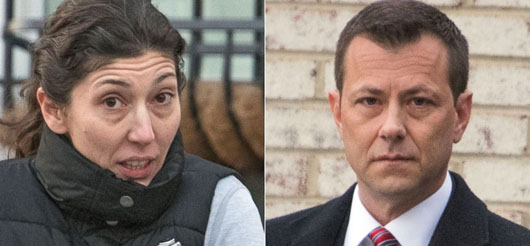by WorldTribune Staff, July 9, 2018
A stream of FBI memos being produced to House and Senate committees are increasingly connecting the “dots between expressions of political bias and official actions,” an investigative journalist wrote.

“We already know from FBI counterintelligence agent Peter Strzok’s now-infamous text messages with his fellow agent and reported lover, Lisa Page, that Strzok – the man driving that Russia collusion investigation – disdained Donald Trump and expressed willingness to use his law enforcement powers to ‘stop’ the Republican from becoming president,” John Solomon wrote in a July 6 analysis for The Hill.
But, Solomon asked, “did those sentiments affect official actions?”
The FBI memos show “damning” and “troubling” evidence that the biased texts are linked to anti-Trump action, Solomon wrote, citing sources involved in the production of the memos to Senate and House committees.
“They show Strzok and his counterintelligence team rushing in the fall of 2016 to find ‘derogatory’ information from informants or a ‘pretext’ to accelerate the probe and get a surveillance warrant on figures tied to the future president,” Solomon wrote.
When Trump campaign associate Carter Page wrote to then-FBI Director James Comey complaining of a “completely false” leak about Page’s travel to Moscow, Strzok and his team pounced on it.
“At a minimum, the letter provides us a pretext to interview,” Strzok wrote to Lisa Page on Sept. 26, 2016.
Within weeks, that “pretext” had “been upsized to a Foreign Intelligence Surveillance Act (FISA) court warrant, giving the FBI the ability to use some of its most awesome powers to monitor Carter Page and his activities,” Solomon wrote.
Though he has been subjected to nearly a year of surveillance, Carter Page has not been accused of any wrongdoing.
Some of the memos describe the FBI pressuring DOJ prosecutors to get the warrant on Carter Page approved before Election Day, Solomon noted.
In one email exchange with the subject line “Crossfire FISA,” Strzok and Lisa Page discussed talking points to get then-FBI Deputy Director Andrew McCabe to persuade a high-ranking DOJ official to sign off on the warrant.
“Crossfire Hurricane” was one of the code names for four separate investigations the FBI conducted related to Russia matters in the 2016 election.
“At a minimum, that keeps the hurry the F up pressure on him,” Strzok emailed Page on Oct. 14, 2016, less than four weeks before Election Day.
The day after Trump’s victory over Hillary Clinton, Nov. 9, 2016, the FBI counterintelligence team “engaged in a new mission,” bluntly described in another string of emails prompted by another news leak, Solomon noted.
“We need ALL of their names to scrub, and we should give them ours for the same purpose,” Strzok emailed Page on Nov. 10, 2016, citing a Daily Beast article about some of former Trump campaign chairman Paul Manafort’s allegedly unsavory ties overseas.
“Andy didn’t get any others,” Page wrote back, apparently indicating McCabe didn’t have names to add to the “scrub.”
“That’s what Bill said,” Strzok wrote back, apparently referring to then-FBI chief of counterintelligence William Priestap. “I suggested we need to exchange our entire lists as we each have potential derogatory CI info the other doesn’t.” CI is short for confidential informants.
Solomon wrote: “It’s an extraordinary exchange, if for no other reason than this: The very day after Trump wins the presidency, some top FBI officials are involved in the sort of gum-shoeing normally reserved for field agents, and their goal is to find derogatory information about someone who had worked for the president-elect.”
While more revelations “are certain to occur” as the memos keep pouring in, “irrefutable proof exists that agents sought to create pressure to get ‘derogatory’ information and a ‘pretext’ to interview people close to a future president they didn’t like,” Solomon wrote.
“Clear evidence also exists that an investigation into still-unproven collusion between a foreign power and a U.S. presidential candidate was driven less by secret information from Moscow and more by politically tainted media leaks.”
Subscribe to Geostrategy-Direct __________ Support Free Press Foundation
